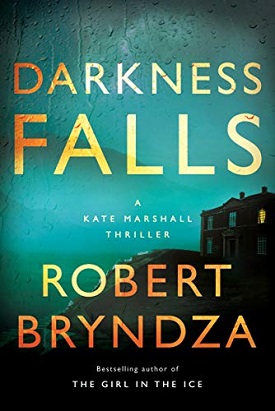 Synopsis:
Synopsis:
Kate Marshall’s detective agency takes off when she and her partner, Tristan Harper, are hired to investigate their first big case. It’s a cold one, over a decade old.
Twelve years ago, Joanna Duncan, a determined young journalist, exposed a political scandal with major repercussions. In the aftermath, she disappeared without a trace. She was never found, her fate unknown. While most people have moved on, Joanna’s mother refuses to let go.
When Kate and Tristan examine the case files, revisiting the same suspects and following the same leads, but not to the same dead ends. Among Joanna’s personal effects, Kate discovers the names of two young men who also vanished without a trace. As she finds connections between their last days and Joanna’s, Kate comes to believe that Joanna may have been onto something far more sinister than anyone first believed: the identity of a serial killer hiding in plain sight and preying on people who will be missed by few.
But the closer Kate comes to finding the killer, the darker things become . . .
Review:

Kate Marshall’s life has changed since readers last saw her in Shadow Sands. It is May 2015, and eighteen months have passed since the sudden death of Kate’s dear friend of nine years and Alcoholics Anonymous sponsor, Myra. It was a shock when Kate learned that Myra willed her both her business and her home, which Kate now uses as an office, on the condition that she quit her job as a lecturer in criminology at Ashdean University and launch her own detective agency. Nine months ago, in partnership with Tristan, her former assistant, they launched the business.
As the story opens, Kate is contacted by Bev Ellis, who explains that her daughter, Joanna, then twenty-eight years old, disappeared in September 2002 — “just vanished into thin air.” Two months ago, Bev begun cohabiting with her partner of nearly thirty years, Bill, the wealthy owner of a company that provides building materials for large road construction projects and a collector of fine art. Bev has just been notified that the police are deeming the case “inactive” and ceasing their efforts to locate Joanna. She needs answers about her daughter’s fate. She knows that Joanna is most likely dead, but implores Kate to do what the police have given up on accomplishing: finding Joanna’s body so that Bev can lay her to rest. Bev is tired of being patronized by male officers, and convinced that Joanna was the victim of foul play. She was an up-and-coming investigative journalist for a local newspaper with dreams of landing a job in London with a major publication and had recently married Fred, who was not a suspect in her disappearance because local villagers confirmed his alibi. Fred apparently thwarted her career ambitions by refusing to consider a move to London. Six months before Joanna vanished, she published an exposé on Noah Huntley, a local member of Parliament who was accepting bribes in exchange for awarding council contracts. After the story was carried by the national press, Huntley lost his seat in a special election. Joanna’s car was found in the parking structure near the newspaper’s office, her phone underneath the vehicle. It was powered off and bore no fingerprints — not even Joanna’s. Her laptop computer and notebooks were never located. Her editor confirmed that she was not working on any particularly controversial stories that might have placed her in danger, and her husband insists she had no enemies. Vague notes about them were found in the files removed from her desk.
Kate and Tristan are shocked to learn that Bill has managed to procure twenty boxes of materials that make up the official police file. Bilo produces a letter from the police superintendent thanking him for supporting a benevolence fund and confirming that the files have been loaned to him for three months. Kate’s contacts in the police department and knowledge of forensics, coupled with witness statements, the timeline put together by the investigating officers, and the other materials contained in the official file convince her to take the case. She and Tristan take custody of the files, and get busy scanning and analyzing the voluminous documentation. They quickly uncover many salient details that Bev omitted during their meeting with her. And a photograph establishing that Joanna met with Huntly two weeks before she went missing. Huntley claimed that Joanna requested the meeting because she was applying for a job with the Daily Mail and Huntley was a member of the board of directors. She allegedly sought him out to ensure that he would not torpedo her chance to secure the job. Kate and Tristan soon discover that there were more angles to Joanna’s investigation of Huntley than were included in her published exposé, including misappropriation of public funds and encounters with male prostitutes.
A note in Joanna’s handwriting references David Lamb, who disappeared in 1999 at the age of nineteen, and Gabe Kemp, who went missing in 2001. Both had “no fixed abode.” As the investigation proceeds, it encompasses a quest to determine their fate, as well as Joanna’s. Both may have been “rent boys,” a British term for male prostitutes, and the search takes decidedly dark turns. Bryndza intersperses chapters focused on Tom, who meets Hayden Oakley at Brewer’s Arms, a small gay bar. Tom is a businessman who buys Hayden expensive drinks, as Hayden plans to lace his drink with Rohypnol. But Tom is a step ahead of Hayden, who realizes too late that he has been outwitted and is in danger. But who is Tom? Is there a connection between him, Joanna, and the two missing young men? And why didn’t the police perform a thorough background check on Bill and his business interests? Could Joanna have been on the trail of serial killer?
Darkness Falls is a straight-forward examination of Kate and Tristan’s efforts to solve a case that seems to become exponentially more complex with each discovery of relevant evidence. Readers have come to expect intricately plotted and inventive mysteries from Bryndza, and Darkness Falls further cements his reputation as a clever storyteller. In the first two volumes of the series, Nine Elms and Shadow Sands, Bryndza introduced Kate and Tristan, and focused on their personal lives, revealing Kate’s history on the police force and the details of her unfortunate relationships with Peter Conway, a psychopathic serial killer, as well as her ongoing struggle to maintain her sobriety and maintain a healthy relationship with her son, Jake. Like every recovering alcoholic, Kate resists the urge to drink one day at a time, attending meetings but declining to enlist a sponsor to take Myra’s place. Her guilt about the times when she lost the trust of those she loves most, especially Jake, inspires her to remain sober. And she now juggles her responsibility to operate the caravan park and surf shop that she inherited from Myra with the demands of the fledgling detective agency. Bryndza further develops Kate and Tristan’s relationship. Tristan has a complicated relationship with his sister, and struggles to confidently live life on his own terms. He and Kate are loyal, supportive friends, and their interactions and dialogue are believable and endearing. But the focus in Darkness Falls is squarely on the methodical investigation Kate and Tristan conduct in their quest to find answers for a mother who has been grieving the loss of her daughter for more than twelve years and desperately wants resolution and, if possible, peace.
Bryndza has crafter another richly atmospheric and unpredictable mystery, populated with a strong cast of intriguing and often nefarious supporting characters. He expertly alternates the storyline relating Kate and Tristan’s efforts with the horrific behavior of Tom, keeping readers guessing as to how the two might possibly intersect and lead to the discovery of Joanna’s remains. It’s an engrossing tale with a satisfying conclusion that leaves readers clamoring for the next installment in Bryndza’s absorbing and entertaining series.
Excerpt from Darkness Falls
PROLOGUE
Saturday, September 7, 2002
Joanna Duncan stepped out of the office building and crossed the road with her head down against the rain. The rain was good, thought the man watching her from inside the car. People saw less with their heads down and umbrellas up.
Joanna was moving fast, marching up toward the old Deansgate multistory car park. She was petite with wavy shoulder- length blonde hair and strong, almost gnomic features, but Joanna was far from ugly. She had an earthy warrior- goddess beauty and wore a long black coat and brown leather cowboy boots. He waited for a bus to pass and pulled out of his parking spot. The bus left a spray of dirty water in its wake, and for a moment he lost sight of Joanna. He put on the windscreen wipers. She was close to the bus
stop, where a line of people waited.
At five thirty p.m., things were winding down, shops were getting ready to close, and people were clearing out and going home. The bus reached the stop and pulled over. Just as Joanna crossed behind it, he accelerated past, using the bus to shield him.
The grey cinder- block car park would be demolished in a few months, and Joanna was one of the last people who parked her car there. It was close to the office where she worked, and she was stubborn. This stubbornness helped realise his plan.
As he turned right into the car park entrance, he saw Joanna was just passing the bus. The car ramp twisted and turned, and he arrived, giddy from driving up in circles, on the third floor. Joanna’s blue Ford Sierra was the only car on the level, parked in the middle of an empty row. The interior of the car park was dimly lit, and at intervals there were rough, wide windows open to the elements. In the fading light, a faint spray of rain was coming in and darkening the already-damp concrete.
He parked his car in the space to the left of the lift shaft and the stairwell. The lifts didn’t work, so she would take the stairs. He switched off the engine and got out, hurrying over to one of the windows looking down on the high street. He saw the top of her head as she crossed the road to enter the car park. He hurried back to the car, leaned inside, and popped open the boot. He took out a small thick black plastic bag.
She was fast, because he’d barely prepared the bag when he heard the scuff of her shoes in the stairwell. This felt messy, and he was having to think on his feet. He positioned himself by the entrance to the stairwell. As soon as Joanna reached the top and stepped out, he slipped the bag over her head, yanked her backward, and used the handles to pull the plastic tight around her neck.
Joanna cried out and staggered on her feet, dropping the large handbag she carried. He pulled the bag tighter. The plastic sat flush over her skull and bulged at the mouth and nose as she fought to breathe.
Gripping her hair and the plastic bag together, he pulled tighter, and she gave a strangulated moan.
A cold breeze came through the windows, and he felt a spray of rain on his eyes. Joanna flailed and gagged, trying to scrabble at the thick plastic. He was much taller, but it took all his effort to keep hold and not overbalance.
It always amazed him how long it took for a person to suffocate. The will to live was too time consuming for TV dramas. After the first minute of fruitless clawing at the slick plastic covering her head, Joanna got clever, and she started to attack, landing two good punches to his ribs and aiming a kick toward the groin, which he managed to dodge.
He was sweating with exertion as he took one hand off the plastic, reached round, and grabbed her throat, lifting her clean off the concrete so the bag became a noose, quickening her death.
Joanna kicked in the air, then gave a terrible rattling moan, as if she were winding down. With a final shudder, she was still. She dangled in his grip for a moment, and then he let go. Her body hit the concrete floor with a nasty hollow thud. He was soaked in sweat, and he struggled to catch his breath. He coughed, and the sound echoed around the vast empty space. The multistory car park stank of urine and damp. He felt the cold air on his skin, and he looked around. He knelt, tied a knot in the plastic bag at the nape of her neck, and dragged her body over to his car. He laid her on the ground in the gap beside his car and the outer wall of the lift shaft. He opened the boot and picked up her limp body, putting one of his arms under her legs and the other under her shoulders, much like a groom carries his new bride across the threshold. He placed her in the back of the car, covered her with a blanket, and closed the boot. With a flash of panic, he saw that her handbag was still on the floor beside the stairs. He grabbed it and returned to the car. Her laptop and notebook were inside the bag with her mobile phone. He checked the call log and the text messages, and then he switched it off and wiped it down thoroughly with a cloth. He hurried over to Joanna’s car and dropped her phone underneath.
He spent another minute with a flashlight, checking carefully over the patch of ground where he’d grabbed Joanna to see if she’d dropped anything, but all was clear.
He got into his car and sat for a moment in the silence.
What now? She had to disappear. Her body. Her computer. All DNA evidence had to vanish.
An idea came to him. It was bold and risky, but if it worked . . . He started the engine, and he drove away.
Excerpted from Darkness Falls, copyright © 2021 by Robert Bryndza. Published by Thomas & Mercer. All rights reserved.
Also by Robert Bryndza:
Kate Marshall Crime Thriller Series
Erika Foster Crime Thriller Series
















Comments are closed.